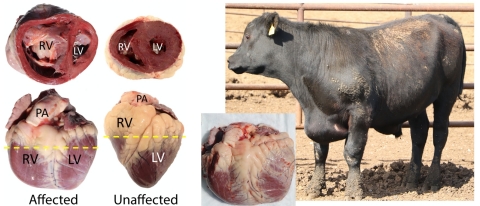New Genetic Test for Bovine Congestive Heart Failure May Help Breeding and Management Decisions
New Genetic Test for Bovine Congestive Heart Failure May Help Breeding and Management Decisions
MatMaCorp has quickly translated newly identified genetic risk factors, ARRDC3 and NFIA, into a rapid and cost-effective test for BCHF, an untreatable, fatal condition prevalent in feedlot cattle in the Western Great Plains of North America
LINCOLN, Neb. & SAN DIEGO--(BUSINESS WIRE)--A team of researchers from the USDA’s Meat Animal Research Center in Clay Center, Nebraska (USMARC) and University of Nebraska-Lincoln (UNL) have identified two major genes associated with bovine congestive heart failure (BCHF) in beef feedlot cattle. This study is the first to confirm genetic risk factors associated with BCHF. Collaborating with scientists from MatMaCorp, a developer of diagnostic systems for science, agriculture, and medicine, this information was rapidly translated into a genetic test that is already being used to inform selective breeding and animal health management.
The research is being presented today at 1:55 pm at the International Plant & Animal Genome (PAG) XXVIII conference taking place in San Diego.
BCHF involves pulmonary hypertension that culminates in right ventricular failure and eventually death. For some producers, BCHF is the single most costly health-related problem with losses exceeding $250,000 annually in individual operations, surpassing those from bovine respiratory disease.1
“Reducing the impact of BCHF is a high priority for the cattle industry,” said Dr. Brian Vander Ley, assistant professor, veterinary epidemiologist at UNL, and co-principle investigator on the project. “One of our aims is to develop a genetic test for BCHF to help manage this disease and improve animal health and well-being.” Mitigating BCHF will have a positive impact on beef feedlot cattle, especially in the Western Great Plains of North America, which are home to approximately 20% of the national herd.2
Samples of 102 cases of BCHF and 102 unaffected matched pen mates were used in a genome-wide association study, which revealed 21 genomic regions highly associated with BCHF. Regions with the strongest association included the arresting domain-containing 3 protein (ARRDC3) and nuclear factor IA (NFIA) genes. Animals with both risk factors were approximately 15-fold more likely to have BCHF compared to those without (p-value < 10-10).
Although the roles of these genes in disease pathogenesis are unknown, their discovery facilitates classifying animals by genetic risk for heart failure and will allow producers to make informed decisions for selective breeding and animal health management.
“Prior to this study, there were no known genetic risk factors for BCHF,” said Michael Heaton, USMARC scientist and co-principle investigator on the project. “Once we had the associated genes in hand, we wanted to begin validating the two best markers immediately because animals are dying every day from this disease. Our aim was to use a platform that allowed us to transfer the technology without delay. Working closely with MatMaCorp scientists, we developed our first targeted genetic test for BCHF in one week. Soon after, we began validating our results in newly identified BCHF cases, and subsequently we identified high- and low-risk calves in a crop of more than a thousand from a severely affected herd.”
Dr. Vander Ley added, “It looks like these markers can provide immediate information to make breeding decisions today that can reduce losses for next year’s feedlot cattle. They may also allow us to identify high-risk cattle from affected herds that can be managed more effectively to reduce the impact of disease.”
“This is an example of an ideal application for MatMaCorp’s technology,” said Dr. Abraham Oommen, MatMaCorp founder and President. “We can easily take genetic data and rapidly develop a cost-effective, simple test that allows significant in-the-field decisions for a wide range of applications. We look forward to seeing this research advance and also working closely with USMARC and UNL to improve the BCHF genetic test and confirm breeding outcomes.”
1 Heaton MP, Bassett AS, Whitman KJ et al. “Evaluation of EPAS1 variants for association with bovine congestive heart failure.” F1000Research, 2019, 8:1189.
2 Drouillard J. “Current situation and future trends for beef production in the United States of America — A review.” Asian-Australas J Anim Sci, 2018;31(7):1007-1016.
About MatMaCorp
MatMaCorp (Materials and Machines Corporation) is a developer of comprehensive solutions for science, medicine, and agriculture. By combining engineering, life science, and information technology, MatMaCorp has developed a portable, easy-to-use, and affordable suite of products to power genetics for human diagnostics, animal conservation, and agriculture applications, including food safety, and breeding. By eliminating the need for large laboratory equipment like centrifuges, pipettes, and refrigerators, MatMaCorp’s products are geared towards making molecular biology and diagnostic techniques accessible to anyone, anywhere, anytime, and without contamination and background noise. Solas 8TM is a portable device that combines both the purification and detection of DNA/RNA. DNA/RNA purification on the Solas 8 is accomplished with the MagicTip™ and SNP/sequence detection is done using C-SAND™ Assays. For more information, please visit www.matmacorp.com and follow the company on Twitter.
Contacts
Media Contact: Jessica Yingling, Ph.D., Little Dog Communications, 1.858.344.8091, jessica@litldog.com.

